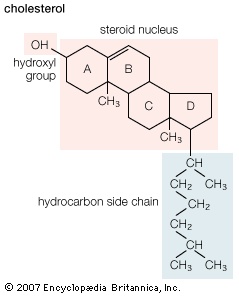cholesterol
chemical compound
 a waxy substance that is present in the blood plasma and in all animal tissues. Chemically, cholesterol is an organic compound belonging to the steroid family; its molecular formula is C27H46O. In its pure state it is a white, crystalline substance that is odourless and tasteless. Cholesterol is essential to life; it is a primary component of the membrane that surrounds each cell, and it is the starting material or an intermediate compound from which the body synthesizes bile acids, steroid hormones, and vitamin D. Cholesterol circulates in the bloodstream and is synthesized by the liver and several other organs. Human beings also ingest considerable amounts of cholesterol in the course of a normal diet. A compensatory system regulates the amount of cholesterol synthesized by the liver, with the increased dietary intake of cholesterol resulting in the liver's decreased synthesis of the compound.
a waxy substance that is present in the blood plasma and in all animal tissues. Chemically, cholesterol is an organic compound belonging to the steroid family; its molecular formula is C27H46O. In its pure state it is a white, crystalline substance that is odourless and tasteless. Cholesterol is essential to life; it is a primary component of the membrane that surrounds each cell, and it is the starting material or an intermediate compound from which the body synthesizes bile acids, steroid hormones, and vitamin D. Cholesterol circulates in the bloodstream and is synthesized by the liver and several other organs. Human beings also ingest considerable amounts of cholesterol in the course of a normal diet. A compensatory system regulates the amount of cholesterol synthesized by the liver, with the increased dietary intake of cholesterol resulting in the liver's decreased synthesis of the compound.High levels of cholesterol in the bloodstream are an extremely important cause of atherosclerosis. In this disorder, deposits of cholesterol and other fatty substances circulating in the blood accumulate in the interior walls of the blood vessels. These fatty deposits build up, thicken, and become calcified, eventually converting the vessel walls to scar tissue. The deposits narrow the channels of the blood vessels and thus can constrict the blood flow, causing heart attacks and strokes. High levels of cholesterol in the blood (more than 240 mg of cholesterol per 100 cc of blood plasma) accelerate the buildup of cholesterol deposits in the vessel walls; people with high cholesterol levels thus eventually become more susceptible to coronary heart disease.
Cholesterol is insoluble in the blood; it must be attached to certain protein complexes called lipoproteins in order to be transported through the bloodstream. Low-density lipoproteins (LDLs) transport cholesterol from its site of synthesis in the liver to the various tissues and body cells, where it is separated from the lipoprotein and is used by the cell. High-density lipoproteins (HDLs) may possibly transport excess or unused cholesterol from the tissues back to the liver, where it is broken down to bile acids and is then excreted. Cholesterol attached to LDLs is primarily that which builds up in atherosclerotic deposits in the blood vessels. HDLs, on the other hand, may actually serve to retard or reduce atherosclerotic buildup.
The chief means of avoiding high cholesterol levels in the blood is to lower one's dietary intake of cholesterol. Because cholesterol is present in animal fats (i.e., saturated or polysaturated fats) but not in fats obtained from plant sources (i.e., unsaturated or polyunsaturated fats), this can be done by: (1) reducing one's total intake of fats, (2) partly or wholly replacing one's consumption of saturated fats with that of unsaturated fats, and (3) reducing one's consumption of foods containing cholesterol. Thus, foods high in saturated fats, such as lard, butter, cheese, whole milk, red meat, candy, and baked goods containing shortening, would be avoided, as would such cholesterol-containing foods as egg yolks, shrimp, and brains and other animal organs. Unsaturated fats such as fish oils and corn, peanut, safflower, and soybean oils would be substituted for animal fats. Recently, the fish oils found in salmon, tuna, mackerel, and certain other marine fishes were found to raise HDL levels and thus reduce or retard atherosclerotic processes. Extensive research has now verified the causal relation between a cholesterol-rich diet, high blood cholesterol levels, and coronary heart disease, but authorities disagree about the overall value of long-term cholesterol reduction for the “normal” individual. See also lipoprotein.
- Arab League
- Arab Legion
- Arab Monetary Fund
- Arab Petroleum Exporting Countries, Organization of
- Arab, Shaṭṭ Al-ʿ
- Aracaju
- aracari
- Arachne
- arachnid
- Arachosia
- Arad
- Aradʿ
- Arafura Sea
- Arafāt, Yāsirʿ
- Aragats, Mount
- Arago
- Arago, François
- Aragon
- aragonite
- Aragon, Louis
- Aragua
- Araguaia River
- Araguari
- Arai Hakuseki
- Arakan